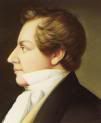 In the physical sciences, a PhD is earned by learning everything there is on a particular topic and then making a small contribution to that field of study. It's a very algebraic system. You define all the variables in the equation and then solve for the unknown X. All the major scientific and technological discoveries in the 20th and 21st centuries have largely been based on this system of individual contributions, built upon prior knowledge. Religion has followed this same secular pattern. Many churches have been founded based solely on on one particular point of doctrine. In contrast, Joseph Smith Jr., the founder of The Church of Jesus Christ of Latter Day Saints, defined all the church's major doctrines, which has remained virtually unchanged to the current day. Below I thought it would be fun to list just some of the major theological contributions of Joseph Smith according to an article by Stephen L. Richards. The breadth and extent of Joseph's contributions is evidence to his divine calling, authority, and inspiration.
In the physical sciences, a PhD is earned by learning everything there is on a particular topic and then making a small contribution to that field of study. It's a very algebraic system. You define all the variables in the equation and then solve for the unknown X. All the major scientific and technological discoveries in the 20th and 21st centuries have largely been based on this system of individual contributions, built upon prior knowledge. Religion has followed this same secular pattern. Many churches have been founded based solely on on one particular point of doctrine. In contrast, Joseph Smith Jr., the founder of The Church of Jesus Christ of Latter Day Saints, defined all the church's major doctrines, which has remained virtually unchanged to the current day. Below I thought it would be fun to list just some of the major theological contributions of Joseph Smith according to an article by Stephen L. Richards. The breadth and extent of Joseph's contributions is evidence to his divine calling, authority, and inspiration.
1. First Vision Brought Certainty of the Godhead: God is our literal spiritual Heavenly Father, and Jesus Christ is the literal physical Son of God. Heavenly Father and Jesus Christ are embodied, perfect, glorified, but separate beings.
2. Character of the Holy Ghost: The Holy Ghost is a separate being from God the Father and Jesus Christ. He is a member of the God Head but is also a separate personage of spirit in the form of a man, yet one in purpose with God the Father and the Son Jesus Christ.
3. New Concept of the Priesthood: Joseph Smith resolved the age old dichotomy concerning the catholic doctrine on succession and the protestant doctrine on the "priesthood of all believers." All worthy male members of the church are given the priesthood and can trace their priesthood lineage back to Joseph Smith who received that priesthood under the hands of the resurrected John the Baptist and the Apostles Peter, James and transfigured John.
The Prophet defined the roles and differences between the Aaronic and Melchizedek Priesthoods. He also defined and restored the roles of the many priesthood offices and quorums in the the church such as the 12 Apostles, the Seventy, Bishops, Evangelists, Teachers, Priests, Deacons, and Elders.
4. State of Man: Joseph taught the pre-earth existence, free agency, and eternal progression of man.
5. New Concept of Human Body: The body is the tabernacle of the spirit, and consequently should be kept pure and clean. The Word of Wisdom admonishes against the consumption and use of alcoholic, tobacco, and stimulant products.
6. Family of God Exaltation of Man: Joseph Smith taught a literal and universal physical resurrection and general salvation from Hell for all. However, there are differing degrees of glory in heaven. Goodness and obedience will merit a preferential place and condition in heaven, available to all who will prepare to receive Exaltation in the Celestial Kingdom of God
7. Temples and Work for the Dead: Joseph Smith was the first Christians to integrate Christ-centered, temple worship and re-institute vicarious work for the dead. Temple ordinances performed by proxy for the dead allow those who lived without opportunity to receive the technically necessary performances, to accept the work done by the living on their behalf.
8. Sealing of Husband and Wife: Marriage and family relationships are eternal covenants that can remain enforce in the next life. He made the father a king and a priest and the mother a queen and a priestess in the temple of the home. Joseph established the family as the fundamental organizational unit in heaven.
9. New Church Organization and Practice: Joseph Smith defined and restored the church's quorums, divisions, agencies, authorities, officers; including the church's missionary system, the women's Relief Society, and local lay ministry.
 In the physical sciences, a PhD is earned by learning everything there is on a particular topic and then making a small contribution to that field of study. It's a very algebraic system. You define all the variables in the equation and then solve for the unknown X. All the major scientific and technological discoveries in the 20th and 21st centuries have largely been based on this system of individual contributions, built upon prior knowledge. Religion has followed this same secular pattern. Many churches have been founded based solely on on one particular point of doctrine. In contrast, Joseph Smith Jr., the founder of The Church of Jesus Christ of Latter Day Saints, defined all the church's major doctrines, which has remained virtually unchanged to the current day. Below I thought it would be fun to list just some of the major theological contributions of Joseph Smith according to an article by Stephen L. Richards. The breadth and extent of Joseph's contributions is evidence to his divine calling, authority, and inspiration.
In the physical sciences, a PhD is earned by learning everything there is on a particular topic and then making a small contribution to that field of study. It's a very algebraic system. You define all the variables in the equation and then solve for the unknown X. All the major scientific and technological discoveries in the 20th and 21st centuries have largely been based on this system of individual contributions, built upon prior knowledge. Religion has followed this same secular pattern. Many churches have been founded based solely on on one particular point of doctrine. In contrast, Joseph Smith Jr., the founder of The Church of Jesus Christ of Latter Day Saints, defined all the church's major doctrines, which has remained virtually unchanged to the current day. Below I thought it would be fun to list just some of the major theological contributions of Joseph Smith according to an article by Stephen L. Richards. The breadth and extent of Joseph's contributions is evidence to his divine calling, authority, and inspiration.















